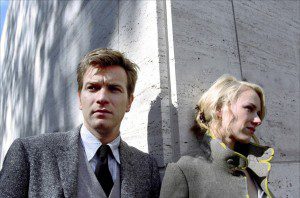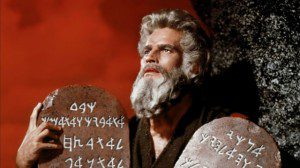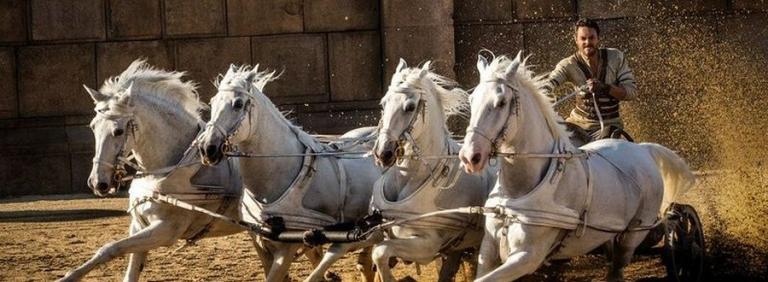 Gladiator gave us a nasty, brutish vision of the world, but it compensated somewhat with a soothing and vaguely pagan belief in the afterlife. The Passion of The Christ gave us the suffering and execution of the Jewish Messiah, but it concluded with a brief glimpse of the resurrection by which he conquered death. Now comes Troy, the biggest Greco-Roman epic of them all — so far — and its theology is of a more agnostic sort.
Gladiator gave us a nasty, brutish vision of the world, but it compensated somewhat with a soothing and vaguely pagan belief in the afterlife. The Passion of The Christ gave us the suffering and execution of the Jewish Messiah, but it concluded with a brief glimpse of the resurrection by which he conquered death. Now comes Troy, the biggest Greco-Roman epic of them all — so far — and its theology is of a more agnostic sort.
Ironically enough, the warriors of this film spend a lot of time killing each other partly because they see no hope for a meaningful life beyond this world; for them, the gods and goddesses are mostly rumors at best, their wills impossible to discern, and the afterlife is a vague, shadowy realm that provides no comfort. For these men, the best kind of immortality they can hope for is to have their names live on the lips of their fellow men for ages to come — and the surest way to ensure their fame seems to be to kill as many people in battle as possible.
Troy, then, is about the quest for personal glory in a heartless and indifferent world, and the unfortunate thing about Wolfgang Petersen’s mega-budgeted, star-studded film is that it, too, lacks heart and comes across like a hollow quest for Hollywood glory. Early on in the film, Agamemnon (Brian Cox), king of all Greece, reluctantly concedes that if he is going to embark on the most ambitious military invasion of all time, he will need Achilles (Brad Pitt), the greatest but also one of the most uncontrollable warriors who has ever lived, on his side. So he sends the smooth-talking Odysseus (Sean Bean) to lure Achilles with the promise that this war will be his greatest opportunity to boost his own fame — and it is not too hard to imagine similar deal-making discussions taking place behind the scenes between moguls, agents, and actors. But while warriors might get away with a blunt display of force, resources, and technical skill, filmmakers must stir the heart and soul. While Troy boasts a stalwart cast and is fairly impressive on a technical level, it falters on nearly every level that might be called artistic or creative.
Let’s start with the screenplay and give writer David Benioff (25th Hour) his due for trying to be relatively faithful to Homer’s epic poem The Iliad, which, despite being essentially the first great work of Western literature, has never fared all that well on the big or small screen. Earlier movies about the Trojan War have borrowed a few elements from Homer, but have tended to focus more on the doomed romance between the Trojan prince Paris (Orlando Bloom) and the Spartan queen Helen (Diane Kruger), whose politically disastrous affair gives Helen’s brother-in-law Agamemnon the excuse he needs to launch his war. Troy, however, puts the emphasis back where it belongs — on the pouting, sulking, hot-tempered and seemingly indestructible warrior Achilles. His seething rage at the start of the poem, and his tearful recognition of his own mortality at the end of it, provide the arc that holds The Iliad together.
Still, despite Benioff’s fidelity to the material — fans of ancient myth may especially enjoy the brief cameo appearances by characters like Aeneas and Anchises — he also heavily demythologizes the story and makes some major changes to its basic narrative contours. (Suffice it to say that at least one major character who is still alive in Homer’s sequel, The Odyssey, bites the dust here.) The gods, who wade into the thick of battle in The Iliad, are virtually absent from this film. A scene of Achilles’s mother Thetis (Julie Christie) predicting his death if he goes to Troy is the closest we get to any hint that the gods may be active in this world, and even this scene is open to interpretation. Achilles himself has been softened into a more romantic and sympathetic character; the Trojan slave girl he claimed as his property in the myth, he now treats more or less like a genuine lover. (The fact that she was committed to celibacy in the service of Apollo before Achilles’s men captured her — in effect, Achilles is sleeping with a nun — is quickly glossed over.)
All these changes would not be so bad if the film had breathed some life into its characters, but the actors do little more than fill the gaps between battle scenes with rote dialogue about glory, honour, seeking the will of the gods, the fact that there is nothing glorious about seeing men die, and so on. Pitt famously worked out for the role, but he still somehow lacks the presence that a formidable character like Achilles requires. Eric Bana (Hulk) is more successful as Hector, the tragic Trojan prince who wants nothing more than to protect his family, but goes to war because that is his duty and his talent. Peter O’Toole, as the Trojan king Priam, is restrained to some degree by his regal bearing, but he, too, expresses a love for his family that turns especially poignant in one of the film’s final scenes.
Hanging over everything is the film’s deeply ambivalent inquiry into the nature of religious faith. The nobler characters often talk about honouring the gods, but how does one do that when the gods themselves, according to Greek myth, don’t even honour one another? Achilles, the one person who actually claims to have seen the gods, also commits some of the most sacrilegious acts in the film. Neither honouring nor dishonouring the gods makes any difference to his fate, in the end, because in his world, all mortal humans will end up in Hades.
It is difficult to tell whether Troy feels like a hollow exercise in epic filmmaking because its characters lack any sense of their own purpose, or because Petersen’s direction is so pedestrian and derivative of earlier films. Indeed, Troy fails to offer anything that might compare to the operatic heights of Peter Jackson’s recent Lord of the Rings trilogy. This comparison might seem unfair, but is inevitable when the film features so many digitally generated aerial clashing-army shots, and when two of the film’s co-stars are former members of the Fellowship. These impressions are deepened by James Horner’s unimaginative score, which shamelessly apes the exotic vocalizations of Gladiator whenever it strives to sound mournful and sounds like the perfunctory rush job that it was. Homer’s poem begins with a call for the Muse to sing of Achilles’s rage, but Troy, the film, does not sing the way a movie should.
2.5 stars (out of 4)
–
Talk About It
Discussion starters
1. Is glory a good thing? Can anyone apart from God ever receive it? If so, how? How should we regard “heroes” of the faith, from biblical times to the early church to today?
2. Is immortality something to be grasped, or pursued? How do we perceive immortality, as Christians? What does it mean that Christ has conquered death? If death were not conquered, then how should we regard this life?
3. How do we discern the will of God? What role should “signs” or “omens” play? How do we distinguish between those decisions we are free to make for ourselves, on our own instincts, and those decisions for which we might need a little more divine input?
Related Elsewhere:
A ready-to-download, Bible-based discussion guide is available for this movie here. Use this guide after the movie to help you and your small group better connect your faith to pop culture.
The Family Corner
For parents to consider
Troy is full of stabbings, impalings, and other battlefield wounds, though it does not linger on them so much as acknowledge what happens in warfare. The film also features several scenes of Achilles in the nude, sometimes with his various lovers — the first time we see him, he is in bed with two women — plus it depicts the adulterous affair between Paris and Helen, though not in a graphic way.
— A verison of this review first appeared on the Christianity Today website.












